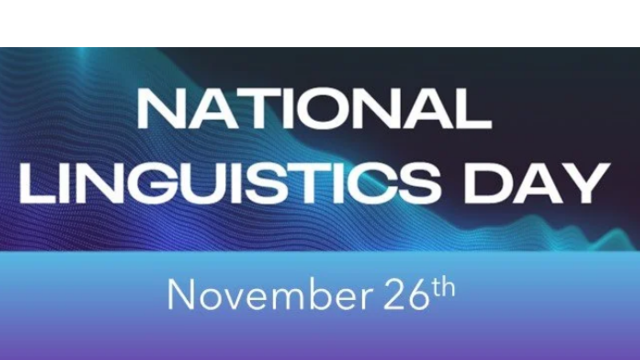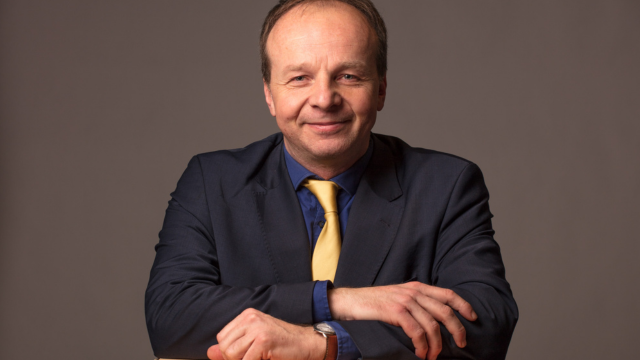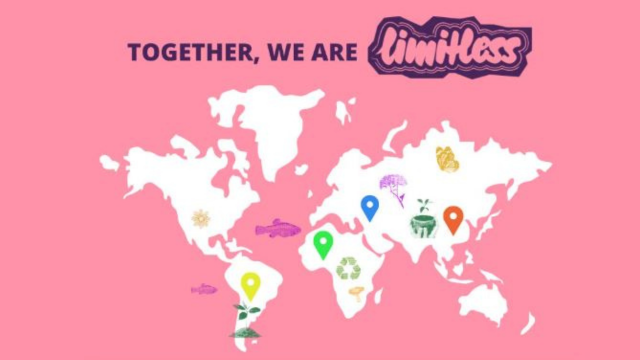-
QUALIFICATIONS
- For Linguists Worldwide
- For UK Public Services
- Preparation
- Policies & Regulation
-
MEMBERSHIP
- Join CIOL
- Professional Membership
- Affiliate Membership
- Chartered Linguist
- Already a member?
- Professional conduct
- Business & Corporate Partners
-
LANGUAGE ASSESSMENTS
- English
- All Other Languages
-
EVENTS & CPD
- Webinars & Events
- CIOL Conferences
- Networks
- CIOL Mentoring
-
NEWS & VOICES
- News & Voices
- CIOL eNews
- CIOL Awards
- The Linguist Magazine
- Jobs & Ads
-
RESOURCES
- For Translators & Interpreters
- For Universities & Students
- Standards & Norms
- CIOL & AI
- All Party Parliamentary Group
- In the UK
- UK Public Services
- Find-a-Linguist
Language - Don't take it 'fourth' granted

We all have daily habits so natural that they slip under our radar. Breathing, eating, sleeping — these are the first three essentials we rarely think about. But there’s a fourth, just as vital, that often goes unnoticed: language. The words we speak, the stories we tell, the way we make sense of the world — language is the silent engine driving much of what we do. Yet, it’s often taken “fourth granted.”
The essentials we overlook
Breathing, eating, sleeping — these are the basics of life. We start them before birth and continue without much thought. Over time, though, many of us develop shallow breathing, poor diets, or disrupted sleep patterns. It’s only when experts or wellness gurus remind us to pay attention that we realise their true importance.
Language, however, is different. We acquire it early, before we can even walk or tie our shoelaces. It’s the tool we use to connect with others, to learn, and to lead. But unlike breathing or sleeping, it rarely gets the attention it deserves in conversations about wellbeing or personal growth.
Language: More than just words
Let’s consider some numbers. The British Council estimates that over 1.5 billion people worldwide are learning English — nearly 20% of the global population. In the UK, the language industry is worth over £1.6 billion annually. Despite this, many native speakers don’t pause to reflect on how language shapes their lives or leadership styles.
A European Commission study found that multilingual employees are 20% more likely to be promoted into leadership roles. Why? Because language isn’t just vocabulary and grammar. It’s empathy, cultural awareness, and the ability to connect across differences. In today’s globalised world, these skills are invaluable.
The native speaker trap and the cultural gap
Being a native speaker doesn’t guarantee you’re a good teacher, communicator, or leader. It’s like thinking someone who’s been breathing all their life is automatically a yoga expert — it just doesn’t follow.
Native speakers often take their language for granted. They may not notice the idioms or slang they use that confuse non-native speakers. When it comes to coaching or training, this can create gaps in understanding.
Picture a leadership coach from London working with a team in Tokyo. They speak English fluently, but their cultural references and metaphors might not resonate. Expressions like “hitting the ground running” or “thinking outside the box” might leave the team puzzled.
This isn’t just awkward — it’s a missed chance to connect. Language can be both a bridge and a barrier. Without awareness, we risk talking past each other.
Leadership needs a new language
Leadership today isn’t just about expertise or charisma. It’s about communication — inspiring, uniting, and motivating people from diverse backgrounds. And that starts with language.
Think of leadership as a recipe. You need psychology, political science, cultural awareness — and a generous helping of language skills. This approach, called Eclectic Leadership, blends insights from different fields to meet the demands of a complex, multicultural world.
Just as you wouldn’t bake a cake with only flour, you can’t develop effective leaders with a single skillset. Language is the yeast that helps everything rise.
Training the trainers — and why it matters
The challenge is that leadership trainers and coaches themselves need to understand language deeply. It’s not enough to be experts in business or psychology; they must appreciate language as a living, cultural force.
With the right training, linguists and language specialists can offer fresh perspectives on leadership development. They help leaders navigate cross-cultural communication, avoid misunderstandings, and build inclusive teams.
The cost of miscommunication
The Economist Intelligence Unit reports that 44% of business leaders say poor communication has caused financial losses. In multinational companies, the figure is even higher. That’s billions lost because language was taken for granted.
The solution lies in creating a new framework for training and certifying coaches, trainers, and leaders — one that places language at the heart of leadership development.
Imagine leadership programmes that include modules on language awareness, cultural competence, and cross-cultural communication. Trainers certified not only in coaching techniques but also in language skills. Organisations investing in language training as a core leadership strategy.
This isn’t just an idea — it’s the logical next step.
Language shapes thought
The Sapir-Whorf Hypothesis suggests that the language we speak influences how we think. Some languages have numerous words for snow; others have none. These differences shape perception.
Research from Stanford University shows bilingual people excel at problem-solving and multitasking. They’re more open-minded and adaptable — qualities essential for leadership.
What can you do?
Whether you’re a leader, coach, teacher, or someone keen to make a difference, here’s a simple challenge:
- Pay attention to language. Notice the words you use and the stories you tell. Don’t take language for granted.
- Invest in language skills. Learn a new language, improve your communication, or explore cultural nuances in your own tongue.
- Celebrate diversity. Embrace different languages and perspectives within your team or organisation.
- Support trainer development. If you’re involved in leadership training, ensure language awareness is part of the curriculum.
- Lead by example. Use your words to inspire, unite, and create positive change.
The Multilingual Future
Language is more than just a means of communication — it’s the key to unlocking leadership potential in a globalised world. Taking it fourth granted means missing out on one of the most powerful tools for connection and influence.
The future belongs to leaders who understand this. Leaders who embrace eclectic, multilingual approaches to leadership development. Leaders who see language not just as words, but as a pathway to empathy, innovation, and lasting impact.
Shehzaad Shams is based in London, UK. He is the COO at Aesara Partners, and also the founder of Rononiti, a consultancy on language and leadership. He specialises in Operations & Project Management, speaks nine languages with varying fluency and does freelance multilingual voice acting and translations. His views are personal.
Read the other blogs by Shehzaad in this series here:
Leadership through languages: Where four fields meet and magic happens
Leadership through languages: Why the blind spot?
The Future of leadership: Why do eclectic leaders and language go hand in hand?
References for further reading
- Fairclough, N. (2001). Language and Power.
- Goleman, D. (1998). Working with Emotional Intelligence.
- Neeley, T. (2017). The Language of Global Success.
- Tenzer, H., Pudelko, M., & Harzing, A. W. (2014). The impact of language barriers on trust formation in multinational teams.
- Charteris-Black, J. (2011). Politicians and Rhetoric.
- Creese, A., & Blackledge, A. (2010). Translanguaging in the bilingual classroom.
- Wilson, S. (2020). Jacinda Ardern: Leading with Empathy.
- Soudien, C. (2015). Nelson Mandela: Comparative Perspectives of his Significance for Education.
- Kornelius, S. (2013). Angela Merkel: The Chancellor and Her World.
Views expressed on CIOL Voices are those of the writer and may not represent those of the wider membership or CIOL.
Filter by category
More
The Chartered Institute of Linguists (CIOL), Incorporated by Royal Charter, Registered in England and Wales Number RC 000808 and the IoL Educational Trust (IoLET), trading as CIOL Qualifications, Company limited by Guarantee, Registered in England and Wales Number 04297497 and Registered Charity Number 1090263. CIOL is a not-for-profit organisation.








